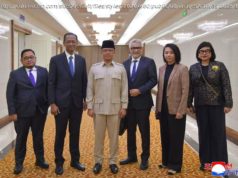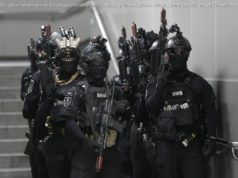President Trump and Commerce Secretary Wilbur Ross openly criticized South Korea amid their first formal meeting with the country’s new leader. It was another case of Trump lecturing an ally, seemingly at odds with U. S. goals of strengthening the alliance against North Korea and its nuclear threat.
President Trump continued his pattern of publicly dressing down U. S. allies Friday, as he met for the first time, in the somber confines of the White House Cabinet Room, with South Korean President Moon Jae In.
Along with Commerce Secretary Wilbur Ross, Trump criticized South Korea for its trade policies as Moon sat across the table and as reporters were unexpectedly allowed into the room to capture the moment.
The exchange allowed Trump to present himself as again being tough on U. S. allies, particularly on trade deficits. But it remains to be seen if the public lecturing might complicate the relationship with Seoul’s leaders, whose help the United States needs to strengthen the alliance against North Korea and its nuclear threat.
“It is clear the South Koreans came under a lot of pressure on the trade deficit, ” said Scott Snyder, senior fellow for Korea studies at the Council on Foreign Relations, a Washington think tank.
Snyder said the president’s focus on trade deficits is anything but surprising, given Trump’s past criticism of KORUS, the name for the 2012 U. S. South Korea Trade Agreement. But it may have surprised some of his key aides, he said, who may have hoped to keep the focus on building a united front against North Korea.
Trump did talk about North Korea on Friday, calling the government of Kim Jong Un “a reckless and brutal regime” and saying the United States was working with South Korea and Japan “on a range of diplomatic, security and economic measures to protect our allies and our citizens.”
But Trump didn’ t announce any specifics about North Korea following his talks with Moon. He was more forthcoming about trade policies. Trump repeatedly said he was negotiating a new trade deal with South Korea. “We want something that will be very good for the American worker, ” he said, soon after welcoming Moon to the White House.
As of late Friday, the two sides had not released a joint statement, so it was not immediately clear that Seoul had committed to renegotiating the 2012 trade agreement, which took five years to finalize before it was ratified by Congress and South Korea in 2011.
The White House did not respond to multiple requests for details. Nor did it provide a translation of how Moon responded to comments by Trump and Ross.
According to a translation provided by a U. S. journalist working for a Chinese media outlet, Moon told Trump that the treaty was “mutually beneficial” but agreed to address issues if “it has gotten out of kilter.”
During bilateral meetings between heads of state, the White House rarely allows cameras to film anything more the obligatory opening comments. Reporters are then escorted out before sensitive discussions begin.
On Friday, reporters were not expected to attend any part of the meeting, but with no warning, a small group was invited in the room just as Trump was pressing Moon about concerns about U. S. trade deficits. Since 2012, the U. S. goods trade deficit with South Korea has more than doubled, to $27.7 billion in 2016.
Trump then asked Ross to comment, and the commerce secretary said “there are a lot of non-tariff barriers to U. S. exports” in South Korea, particularly involving automobile exports.
“We also have a separate problem with oil field tubular goods and steel products, ” Ross added. A lot of what South Korea ships to the United States “is dumped Chinese steel, ” he said.
Gary Cohn, Trump’s National Economic Council director, then talked about China’s “predatory practices” and barriers to U. S. companies that want to export goods to China, or do business there.
“The U. S. has many trade deficits with many countries, and we cannot allow that, ” said Trump. “And we will start with South Korea right now.”
How Moon responded to those claims is not immediately clear, since his comments from the Cabinet room were not immediately broadcast and translated. Later, during comments in the Rose Garden, he made no mention of trade issues, but reaffirmed the alliance with the United States.
“Economic partnership between our countries forms an essential pillar for future-oriented developments of the alliance, ” said Moon, a human rights lawyer who took office on May 10. “We both agreed on this view.”
Moon also said he had invited Trump to visit South Korea later this year, and the president accepted.
While it may have been jarring to Moon or other Korean officials, Trump often uses the same blunt language he used on the campaign trail in his official meetings with foreign leaders, even the United States’ closest allies.
In a call with Mexican President Enrique Peña Nieto, Trump threatened to send U. S. troops to stop “bad hombres down there” unless the Mexican military took better control of the situation. In a call with Australian Prime Minister Malcolm Turnbull, he criticized a deal made by his predecessor, Barack Obama, to accept refugees from Australia and abruptly ended the discussion after angrily telling Turnbull it was his “worst call” of the day.
And in May, Trump scolded NATO allies, accusing them of failing to live up to their financial obligations and leaving Americans to help cover the costs of their nation’s defense.
Trump frequently reserves his harshest criticism when speaking to leaders about trade deals — especially multilateral ones — which he regularly says are costing the United States money.
He called the North American Free Trade Agreement a “disaster” and the worst trade deal in history before announcing he would renegotiate it. He called the Trans-Pacific Partnership, a 12-nation trade deal brokered by Obama, “a continuing rape of our country” before withdrawing from it.
Regardless of future talks with South Korea, U. S automakers and other manufacturers may have only limited ability to export more goods to the country. South Korea’s economy is the fourth largest in Asia, but is slowing, in part because of an aging population.
Домой
United States
USA — Korea Trump, playing to his base, dresses down South Korean leader on trade...






